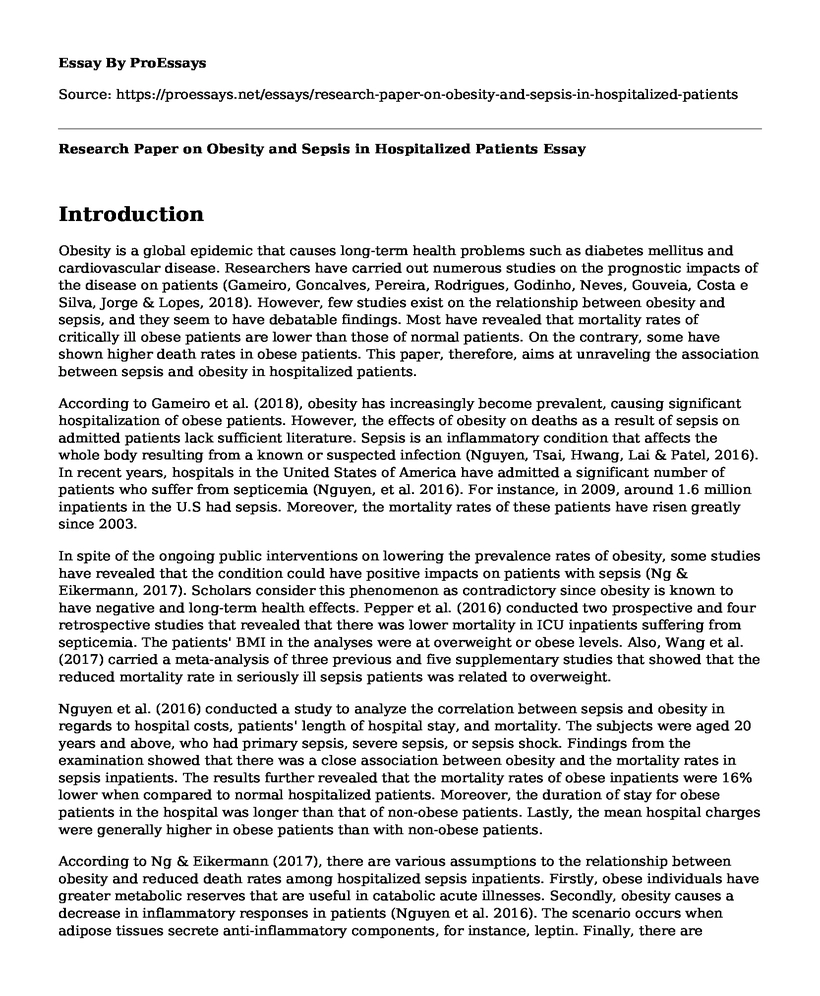Introduction
Obesity is a global epidemic that causes long-term health problems such as diabetes mellitus and cardiovascular disease. Researchers have carried out numerous studies on the prognostic impacts of the disease on patients (Gameiro, Goncalves, Pereira, Rodrigues, Godinho, Neves, Gouveia, Costa e Silva, Jorge & Lopes, 2018). However, few studies exist on the relationship between obesity and sepsis, and they seem to have debatable findings. Most have revealed that mortality rates of critically ill obese patients are lower than those of normal patients. On the contrary, some have shown higher death rates in obese patients. This paper, therefore, aims at unraveling the association between sepsis and obesity in hospitalized patients.
According to Gameiro et al. (2018), obesity has increasingly become prevalent, causing significant hospitalization of obese patients. However, the effects of obesity on deaths as a result of sepsis on admitted patients lack sufficient literature. Sepsis is an inflammatory condition that affects the whole body resulting from a known or suspected infection (Nguyen, Tsai, Hwang, Lai & Patel, 2016). In recent years, hospitals in the United States of America have admitted a significant number of patients who suffer from septicemia (Nguyen, et al. 2016). For instance, in 2009, around 1.6 million inpatients in the U.S had sepsis. Moreover, the mortality rates of these patients have risen greatly since 2003.
In spite of the ongoing public interventions on lowering the prevalence rates of obesity, some studies have revealed that the condition could have positive impacts on patients with sepsis (Ng & Eikermann, 2017). Scholars consider this phenomenon as contradictory since obesity is known to have negative and long-term health effects. Pepper et al. (2016) conducted two prospective and four retrospective studies that revealed that there was lower mortality in ICU inpatients suffering from septicemia. The patients' BMI in the analyses were at overweight or obese levels. Also, Wang et al. (2017) carried a meta-analysis of three previous and five supplementary studies that showed that the reduced mortality rate in seriously ill sepsis patients was related to overweight.
Nguyen et al. (2016) conducted a study to analyze the correlation between sepsis and obesity in regards to hospital costs, patients' length of hospital stay, and mortality. The subjects were aged 20 years and above, who had primary sepsis, severe sepsis, or sepsis shock. Findings from the examination showed that there was a close association between obesity and the mortality rates in sepsis inpatients. The results further revealed that the mortality rates of obese inpatients were 16% lower when compared to normal hospitalized patients. Moreover, the duration of stay for obese patients in the hospital was longer than that of non-obese patients. Lastly, the mean hospital charges were generally higher in obese patients than with non-obese patients.
According to Ng & Eikermann (2017), there are various assumptions to the relationship between obesity and reduced death rates among hospitalized sepsis inpatients. Firstly, obese individuals have greater metabolic reserves that are useful in catabolic acute illnesses. Secondly, obesity causes a decrease in inflammatory responses in patients (Nguyen et al. 2016). The scenario occurs when adipose tissues secrete anti-inflammatory components, for instance, leptin. Finally, there are hemodynamic benefits that result from an activated renin-angiotensin system (Ng & Eikermann, 2017). However, the assumptions are contradictory as several scholars have reported a positive relationship between obesity and inflammation.
Conclusion
In conclusion, the global prevalence of obesity has significantly risen in recent years. Consequently, the number of hospitalized obese patients has also increased. Obesity has been closely associated with sepsis in hospitalized patients, though the existing studies are conflicting. The majority of findings, however, have shown that obesity reduces the mortality rates of inpatients suffering from sepsis. Moreover, further research should take place to give a clearer picture.
References
Gameiro, J., Goncalves, M., Pereira, M., Rodrigues, N., Godinho, I., Neves, M., ... & Lopes, J. A. (2018). Obesity, acute kidney injury and mortality in patients with sepsis: a cohort analysis. Renal failure, 40(1), 120-126.
Ng, P. Y., & Eikermann, M. (2017). The obesity conundrum in sepsis. BMC Anesthesiology, 17. Retrieved from https://www.ncbi.nlm.nih.gov/pmc/articles/PMC5657099/
Nguyen, A. T., Tsai, C. L., Hwang, L. Y., Lai, D., Markham, C., & Patel, B. (2016). Obesity and mortality, length of stay and hospital cost among patients with sepsis: a nationwide inpatient retrospective cohort study. PloS one, 11(4), e0154599.
Pepper, D. J., Sun, J., Welsh, J., Cui, X., Suffredini, A. F., & Eichacker, P. Q. (2016). Increased body mass index and adjusted mortality in ICU patients with sepsis or septic shock: a systematic review and meta-analysis. Critical Care, 20(1), 181.
Wang, S., Liu, X., Chen, Q., Liu, C., Huang, C., & Fang, X. (2017). The role of increased body mass index in outcomes of sepsis: a systematic review and meta-analysis. BMC Anesthesiology, 17(1), 118.
Cite this page
Research Paper on Obesity and Sepsis in Hospitalized Patients. (2022, Nov 16). Retrieved from https://proessays.net/essays/research-paper-on-obesity-and-sepsis-in-hospitalized-patients
If you are the original author of this essay and no longer wish to have it published on the ProEssays website, please click below to request its removal:
- Exemplification Essay on Legal, Ethical, and, Professional Issues for the Nurse
- Disorders of the Eye or Ear: Case Study
- Eradicating Lymphatic Filariasis: WHO's Global War on Disease - Research Paper
- Nursing: From Female-Dominated to Gender-Neutral Profession - Essay Sample
- Essay Example on Freshly Graduated Fairfax Nurses: Examining Sampling Approach
- Paper Example on Mrs. Law's Bone Health: Is Her Diet Missing Key Nutrients?
- Essay Example on COVID-19: Impact on Students, Workers and Society







